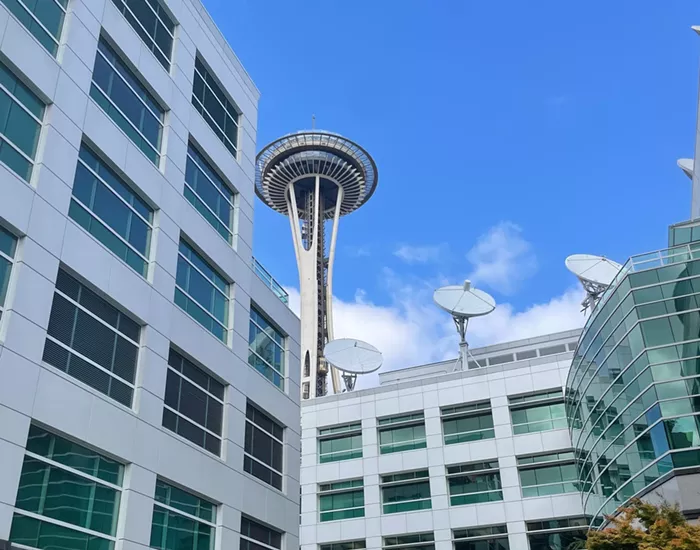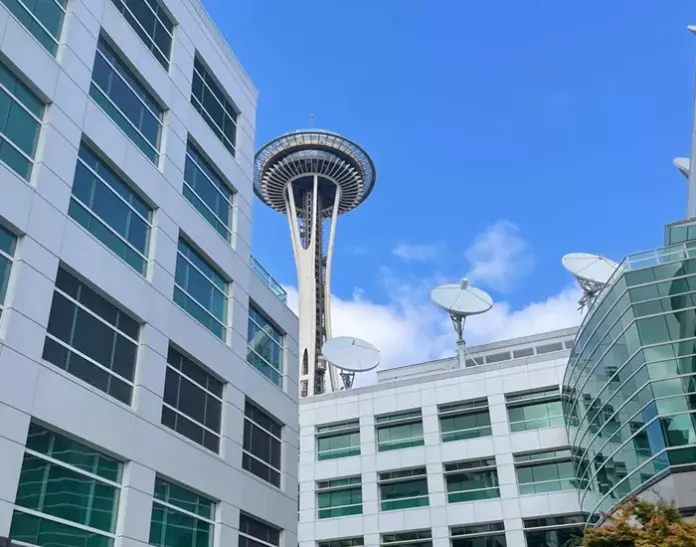This post was originally published on this site

Underneath the Space Needle, between the hulking green-windowed buildings of KOMO Plaza on Thursday, Katie Wilson called on Sinclair Broadcast Group, the parent company of KOMO, to reinstate Jimmy Kimmel Live!
Wilson said if the company continued to kowtow to coercive federal censorship, she would not participate in an upcoming debate with her opponent Mayor Bruce Harrell. The situation—a symptom of the corporate consolidation of media—also prompted Wilson to broadcast her new campaign proposal for public funding for local media.
This week, conservative Sinclair showed its whole ass when it refused to air a freshly reinstated Jimmy Kimmel late night show. Executives at Disney and ABC pulled Jimmy Kimmel Live! off air last week after the host’s lukewarm commentary on Charlie Kirk’s assassination—”We hit some new lows over the weekend with the MAGA gang desperately trying to characterize this kid who murdered Charlie Kirk as anything other than one of them, and doing everything they can to score political points from it”—ruffled Brendan Carr’s feathers, the chair of the Federal Communications Commission. On Tuesday, after Disney adult boycotts sent the company’s stock plummeting ahead of a planned Disney+ streaming subscription price increase , Disney and ABC granted Kimmel his mic once more (the powers that be maintain a different, less wallet-bruising narrative). KOMO’s parent Sinclair did not.
Rather, Sinclair said it wouldn’t air Kimmel until he apologized for his accurate comments and donated to Kirk’s group Turning Point USA. Over 100 Seattleites flocked to KOMO Square near the Space Needle to protest Sinclair’s decision at a protest Saturday. Protesters returned to KOMO Plaza Tuesday for another demonstration.
Sitting for a campaign interview at KOMO’s office earlier this week, Wilson realized “it didn’t sit right” with her to participate. She felt she needed to do something with her platform.
“It is of the utmost importance that we do not let our media, our forums for news and commentary and debate that are so essential to the functioning of our democracy, be subject to control and pressure from the federal government,” Wilson said.
KOMO’s debate, co-presented with the Seattle Channel, is planned for Oct. 8 at Seattle University.
“I really want to do the debate,” Wilson said, calling it a big debate where lots of students will be present. But it’s all dependent on Sinclair “making the right decision.” If the debate doesn’t go forward, there are around 20 other mayoral debates happening this fall.
Regardless of what Sinclair does, Wilson has decided not to spend any more advertising dollars on KOMO.
“I call on Bruce Harrell and his PAC to do the same,” Wilson said.
The whole drama called to mind the precarity of Seattle’s local news environment for Wilson. Without reliable funding, local news outlets will continue to shutter. That happened earlier this week when Cascade PBS laid off its entire 19-person newsroom due to federal funding shortfalls.
Wilson stated that, if elected mayor, she would launch a program similar to Seattle’s Democracy Voucher program to fund local news outlets. Under this plan, residents would get $150 worth of vouchers to spend on whichever outlet they wanted. An organization called Save Seattle News proposed this idea years ago, calling it the Local News Dollars program. Local news is vital for an informed, engaged society. Without it, won’t we sink further into the misinformation muck?
“Public funds can help to sustain and grow our local news ecosystem without giving politicians the power to influence news coverage,” Wilson said. She went on to stress the importance of local news—something all Stranger readers can surely agree with. “Local journalism promotes civic vitality and undergirds our ability to self govern in these dark times.”





















